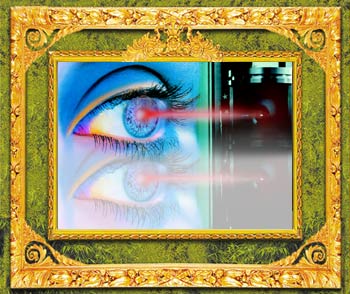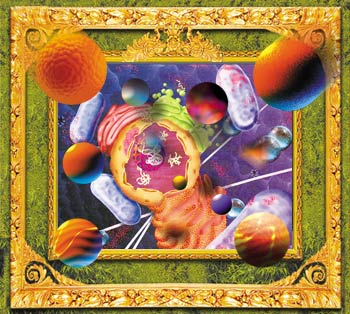The Miniature Factories Comprising Our Bodies: The Cells
The 100 trillion or so cells that make up the human body perform countless activities, without ever stopping, growing tired or needing a rest. By means of the cells all fully carrying out their own tasks in an entirely harmonious labor, our organs and tissues are able to perform their functions, and we can go about our daily lives.
In the same way that every living thing needs energy—and therefore, food—to survive, so the cell also needs various nutrients in order to perform its countless functions. In the same way that raw materials to be used in production are carried inside a factory and stored until needed, and waste products are later sent out of the factory, so a very complex production, storage and waste-disposal system operates within the cell. The raw materials taken in are various organic molecules, minerals and metals. As these are used inside the cell to produce various molecules, waste products are removed from the cell or destroyed within it. At this point, exactly as electricity and other forms of energy are needed for production inside a factory, the cell carries out its activities through the energy produced inside it.
 |
| Going inside the body and then inside cell is a journey to wonderland. Prof. Gerald L. Schroeder |
In the same way that the quality of the raw materials brought to the factory is specified by contract, so the cell observes special conditions for the substances it takes into itself. Substances do not enter the cell at random. As if they were familiarized beforehand, these molecules are subjected to "identity checks" at the cell membrane. There are entryways held open solely for substances regarded as admissible. Other substances, whose entry is regarded as possibly undesirable, are eliminated with a care reminiscent of fingerprint checks. The way the nature of these materials is checked and confirmed before entering the cell is of vital importance. These strict security precautions avoid the risk of entrance of any virus, bacterium or poisonous substance into the cell. This huge responsibility is assumed by the thinnest of membranes.
 |  |
| Substances entering the cell do not do so haphazardly, but are subjected to a very careful identity check. It is of vital importance that substances to the cell be identified correctly. Because of this strict security system, any virus, bacterium or toxin is prevented from entering the cell and doing any harm. | The cell membrane resembles a wall surrounding a building that protects it with strict security measures. In selecting those substances it will admit or expel, the membrane employs a most complex selectivity that varies according to circumstances. |
Each one of the trillions of cells that make up your body acts with this awareness. Each cell membrane implements this sensitive selection mechanism in that part of the division of labor that falls to it. No human being can even be aware that such extraordinary functions are taking place, let alone be able to perform any such selection consciously. The appearance of an intelligence beyond human in the cell membrane shows, as we already stated, that the source of that intelligence is not the cell itself but rather the inspiration of Allah, Who created it. By the command of Allah each and every cell carries out its duties for us flawlessly.
No human's will and intellect can determine, follow or perform any of these tasks which the cell membrane carries out so perfectly and which require consciousness and intelligence. The number of cells in the human body is a literally astronomical figure: three times greater than the number of stars in the Milky Way. Bear in mind that these tasks need to be performed for all cells at all times, day and night and without error, so you can better comprehend the difficult task of the cell membrane.
It will be useful to recall that the words such as mind, intelligence, and foresight used throughout this book usually refer to human activities. Here, however, these terms are used to describe the activities of a thin layer of fat and protein made up of unconscious molecules—in other words, the cell membrane. It is of course impossible for the thinnest of membranes to assume these duties of its own accord and to perform them without error.
As anyone of reason and good conscience will appreciate, Allah reveals His infinite dominion over life with the example of the cell membrane. The intellect we see in the cell is a manifestation of the infinite intellect of Allah. As Allah reveals in one verse of the Qur'an:
"What is in the heavens and in the Earth belongs to Allah. Allah encompasses all things." (Surat an-Nisa', 126)
The membrane is just one of the cell's many complex structures. Before going into detail regarding the cell membrane's structure and its importance, let us first examine briefly some facts about the cell's irreducibly complex structure. (For more detail, see Harun Yahya, The Miracle in the Cell)
- Foreword
- Introduction: The Consciousness Beyond Matter and The Col Lapse of Mechanism
- The Miniature Factories Comprising Our Bodies: The Cells
- The Cell's Complex Structure Can not Be Explained in Terms of Coincidence
- Superior Creation in The Structure of The Cell Membrane
- Complex Transportation Systems in The Cell Membrane
- The Selective Permeability of The Protein Channels in The Cell Membrane
- Selectivity in Nerve Cells
- Signal Selection in Traffic of Data Among Cells
- Selection in The Immune System's Cells
- Vital Selections in The Blood
- The Importance of The Creation in The Cell Membrane in Terms of Multi-Cellularity
- The Delicate Balance in Substances Selected in The Body
- The Cell Membrane Invalidates Claims of The Theory of Evolution
- Conclusion: Allah Pervades Everywhere With His Wisdom
